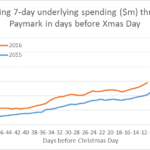Pride and perfection
Bron Thomson’s digital design business Springload has grown into a market leader…
From humble beginnings
Bron Thomson’s digital design business Springload has grown into a market leader. So how did a woman who started her career writing music for local theatre create such a successful business in the traditionally male-dominated IT industry?
It’s funny how life can take you on a journey you never envisaged when you were young.
When Bron Thomson graduated with the unusual combination of a music degree and a maths degree from Wellington’s Victoria University, never in a million years did she think she’d one day command an award-winning IT design company with 33 employees.
Bron’s career began in the gruelling theatre industry writing music for local productions. It was all hard work, long hours and little pay.
“I soon realised that I was making more money designing the posters to promote the shows than I was for writing the music!” she recalls.
Bron describes her business baptism as almost accidental. At university she picked up some freelance website design work and eventually amassed a big enough client base to make a full-time living out of it.
It didn’t take long before Bron had to engage a friend to help her out. Then it got even busier, so a few more friends were roped in.
“When there were four or five of us I realised that it wasn’t really just about me being a sole trader anymore; it was me running a business and enjoying it,” she says.
“I wanted to be in control of my own work environment. I guess I’m a bit of a control freak; I wanted to work with people that I liked, doing work that I liked.
“It’s all been driven by pretty selfish motivations really,” she admits. “I want to work in a company that I want to work in. So if I feel like having a gin and tonic at three in the afternoon, then I want to work in a company where it’s okay to do that. Or if I need to sleep-in ‘cos I’ve had a lousy night, then I want that to be OK too.
“I know that people won’t judge me because they know I work hard, just like I know they do too.”
In terms of learning the trade, Bron is largely self-taught. Her husband Richard was doing an industrial design diploma at the time she was looking for a career change, and she ended up “kind of stealing” his machine, which came with a whole bunch of graphic design software.
“I taught myself how to use Photoshop, Freehand and Illustrator. My other flatmate at the time was a developer. He taught me HTML in return for some graphic design work.” This was 1994 – the very early days of the Internet.
Turns out web design was Bron’s true calling.
“It fits me to an absolute tee,” she says. “I’ve always been a gadget/techy girl; I loved the Matrix movie when it came out – and my half creative/half logical brain suits the web really well.
“I also had a knack for being able to explain stuff to my clients in a way that put them at ease and made things seem easy,” she adds. “I realised that what I’d considered to be common sense is actually not all that common – which still surprises me!”
Bron says Richard, who’s been the primary caregiver of their two children (aged five and seven), has also been her number one business supporter.
“He’s been my advisor and confidante, as well as being bloody smart about the industry in his own right. He’s coped with my crazy excited highs, and teary lows during the natural ebb and flow of growing a company.”
Bron uses a lovely analogy to describe business ownership; it’s like having a baby. “When you’re pregnant you think OMG, ‘I can’t ever imagine being the mother of a 15-year-old; I don’t even know how to be a mother!’
“But the thing is, you don’t have to be the mother of a 15-year-old straight away; you start by being a mother of a tiny newborn. After you’ve nailed that, you start being the mother of a toddler, then a pre-schooler. You just have to take one step at a time – which is a whole lot easier than visualising the big, scary potential future!
“Whenever I get nervous about the future, I just tell myself to concentrate on doing a good job of taking that next step.”
Naturally competitive
Bron believes there’ve always been strong female leaders in the IT industry. Her first two jobs were for companies co-founded by women. She admits to not taking much notice of how many other female tech entrepreneurs are out there. “To be honest, I’m often not that good at noticing stuff like that.
“I’m naturally competitive, so it doesn’t matter whether someone is male or female; if they’re doing a great job then I’ll up my benchmark to try and compete with what they’re doing, and learn from them as much as I can!”
That competitive nature has been the key to Springload’s success, as has Bron’s strong focus on people and relationships.
“One of my early business mentors said to me, ‘if you’re a nice person, if people like working with you, and you back that up with really good work, then your business is sorted’. I think he’s right. My personal motto, and I know it sounds cheesy, is ‘be nice and do good work’.”
Bron’s a self-confessed perfectionist. “I want stuff to be really, really good,” she says. “That last ten percent is the difference between being good, and being great. And I think we should constantly strive for greatness in all aspects of
our lives.”
And maybe there’s a little dollop of crazy in there too. “I get very excited about stuff, and often dance or sing at my desk. I think the excitement can be a bit contagious, especially if I’ve had a gin, or two!” she laughs.
Helping people is her main motivator. Bron’s never been driven by just making money, but has a genuine desire to take problems away from clients. And not just the obvious problem on the surface, but the deeper problem that needs fixing. And that comes from asking ‘why?’ a lot of times.
Her attitude is that if Springload genuinely can’t make a measurable improvement to a business, then they won’t take it on.
“I’d rather be honest and know clients absolutely trust
that my motivation is to help them, not to make money
from them.”
Bron’s one big business lesson is around the fact that things change all the time. Her advice for other business owners is if you’re going through a good phase, don’t rest on your laurels and take it for granted. And if you’re going through a bad phase, know that it too will pass.
“Don’t get too caught up and too pulled down by the drama of the moment; just roll with it and come up the other side having learnt something.”
Business milestones
Growing a business always involves risk taking. One memorable milestone for Bron was moving from one small office, for which they paid $5k a year to lease, to what was meant to be a $15k per year space in the Hope Gibbons Building – her maximum budget. But while the real estate agent was showing her around the new space at the back of the building, he also showed her another space at the front, priced at $25k.
Bron was hooked by the “gorgeous high ceilings” and stunning view over Courtenay Place and the harbour and couldn’t turn it down.
“The first month we were there, a few of the staff were on holiday. My business partner Carl and I looked at each other and thought OMG, what have we done?! “It was a great move though, because within another month we had enough work to fuel growth over the next year to completely fill the space.”
Carl Steward, a former client from the early days, turned friend, came on as a director in 2001 and heads finance and operations.
Alan Doak, who came on as accounts manager in 2009, bought into the business in 2014 and is now head of business development.
“They’re both very awesome and talented people, and I have absolute implicit trust in them both,” she says. “It makes running a business like ours so much easier.”
Success in this business has come from being ‘picky’, believes Bron. She admits to being very picky about the people she hires. “I have a ‘no dick’ policy – that is, I don’t hire anyone that is a bit of a dick.” She describes Springload’s team as “really talented” and “our most precious asset”.
She even admits to having “pride sweep moments” – times when she looks around the office at her staff and the business she’s created and thinks ‘OMG, I started all this’.
“I’m so proud of what we’ve created.”
Bron’s also picky about the clients they take on, preferring long term partnerships where the key to success is good fit.
“Alignment comes in different forms. We want to work with people that we can really make a difference for – that we know will benefit from our digital expertise. We also want to know that they respect and value our expertise.
“Also, I’m a bit of a lefty/greeny, and so won’t work with companies that have dodgy ethics or values. We like working with companies that have the same aspirations as we do to constantly improve and do better, and are looking to do good in the world. “That’s where we can help! Our work is measurable; we can actually measure the tangible improvement we make to their businesses.”
Bron has strong views on being a responsible global citizen too, and this has spilled over into her business through carbon neutrality and a number of healthy and sustainable initiatives. She’s genuinely concerned for the planet and sees technology as a “force for good”.
“I want to make measurable improvements – initially for staff, for clients and for people who use our digital products – but ultimately to benefit the world.”
Digital disruption
Springload is growing and plans to get to about 40 people in the next couple of years.
There are exciting goals in place too. A Melbourne office is on the cards. Bron discovered that Melbourne is a very similar market to Wellington. “Ironically a lot more similar than Auckland is!”
Springload is also increasingly working with business leaders to help them define and navigate digital disruption.
“Dramatic disruption is scary for any business, and for a lot of people digital is still pretty scary,” says Bron. “Clients are looking to us to help them translate technical impact into plain language and help drive a tangible business [improvement] strategy that they can act on to grow their businesses.
“This digital strategy includes helping clients build their own in-house digital teams, or provide coaching to grow their internal capability; helicoptering in technical experts to provide high level specialist expertise; using data and digital-first tools to drive and monitor business KPIs, and lots more.
“Luckily we’re definitely not in a sunset industry. Our specialist expertise at that point where a human being interacts with technology isn’t going away – on the contrary it’s exploding.
“We’re going to keep solving business and human problems with our digital experience.”


